Essential Nutritional Guidelines for Bearded Dragons

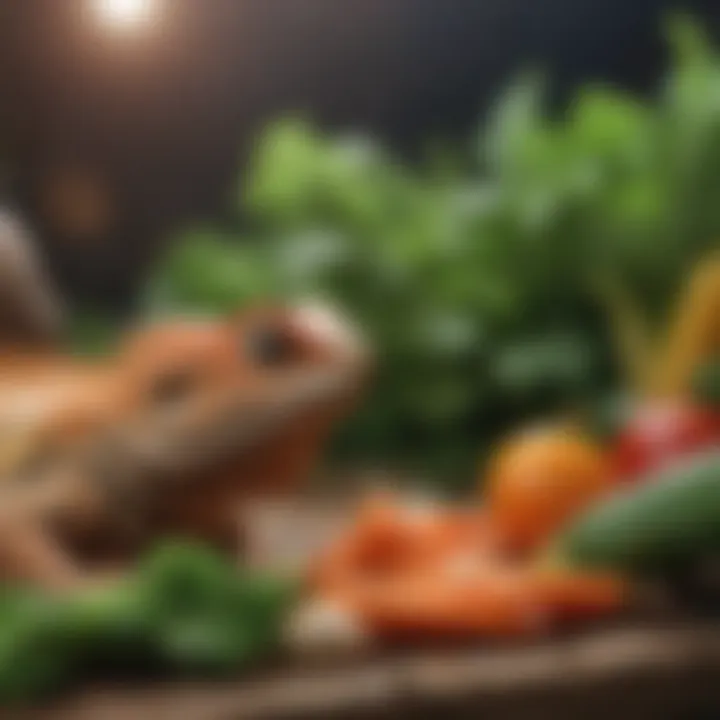
Intro
Feeding a bearded dragon requires careful attention to their unique nutritional needs. These reptiles thrive when provided with a balanced diet that is rich in essential nutrients. An understanding of their dietary requirements presents a necessary foundation for optimal health and longevity. Bearded dragons, originating from arid regions, have specific food preferences that mimick what they would consume in the wild. Failure to address their dietary needs can result in health complications and diminished quality of life. This article outlines key nutritional guidelines, ensuring creature comforts for these fascinating pets.
Care Tips
Daily Care Routines
Daily care routines play a crucial role in the overall wellness of bearded dragons. First and foremost, they should be fed appropriately sized insects in the morning, along with leafy greens. This should be accompanied by access to clean, fresh water. Handling your pet for short periods helps build trust and integrate social interaction. Regular UVB lighting should be maintained for about 12 hours each day, mimicking their natural habitat.
Cage Setup and Maintenance
An ideal setup for your bearded dragon weighs significantly in raisin their comfort. Ensure the enclosure is spacious, allowing them to move freely. A mixture of substrates—like paper towels for easier cleaning, and sand for a natural feel—can enhance the environment. Providing a basking spot is essential; it should maintain temperatures between 95°F to 110°F. Regularly check temperatures and cool ends; night temperatures should not fall below 65°F.
Hygiene and Cleaning Practices
Maintaining a clean habitat is paramount for your bearded dragon’s health. Spot clean daily by removing uneaten food and waste. A deep clean should take place weekly, where a full substrate change occurs. The enclosure should be scrubbed with a reptile-safe disinfectant. Always ensure it is rinsed well before returning your pet to avoid any harmful residue.
Seasonal Care Adjustments
Bearded dragons may require adjustments in care as seasons change. During the colder months, provide extra heat sources since temperature drops impact their behavior and metabolism. Similarly, be mindful of their feeding patterns. Breeding males may need additional protein and care in early spring.
Nutrition Guides
Essential Diet Components
A balanced diet consists primarily of insects, greens, and vegetables. Young bearded dragons need more insects, about 80% of their diet, whereas adults should have more greens, around 20%. Common and suitable insects include crickets and mealworms. Leafy greens such as collard greens, mustard greens, and dandelion greens adhere closely to their preferred nutritional intake.
Safe and Toxic Foods
Awareness of which foods are safe versus those that can pose toxicity is crucial. Safe options encompass grasshoppers, kale, and squash. Toxic choices include avocado, rhubarb, and certain compounds found in potato skins. Keep these hidden from reach and provide an accurate list for reference.
Supplements and Treats
Implementing supplements into your bearded dragon’s diet can enhance key nutrient levels. Use calcium supplements and multivitamins formulated for reptiles. Introduce treats occasionally, like fruit, ensuring they remain limited to less than 10% of their overall intake. Suggested safe fruits are strawberries and blueberries, but avoid feeding these items in excess due to sugar content.
Feeding Strategies for Different Species
Feeding schedules may vary according to an individual bearded dragon's species or size. Hatchlings require feeding multiple times a day, while adults usually thrive on a regimen of feeding every other day. Adjust portion sizes according to their growth and but be careful not to overestimate food availability.
A knowledgeable owner can significantly impact the health and well-being of their bearded dragon through proper nutrition.
Wellness and Health
(Note: No content provided for this subsection as per request.)
Enriching Activities
(Note: No content provided for this subsection as per request.)
Understanding Bearded Dragon Nutrition
Nutritional guidelines are critical in maintaining the health and well-being of bearded dragons. Understanding Bearded Dragon Nutrition is essential for both novice and experienced owners.
A balanced diet tailored to their specific needs helps prevent various health issues, ranging from metabolic bone disease to obesity. Know what they eat impacts not only their overall happiness but also their lifespan.
By examining the specific components of their diet, owners can enhance the quality of nutrition provided. Many individuals may overlook how nuances in their dietary requirements can change based on factors like age, size, and health status.
Importance of a Balanced Diet
A balanced diet provides essential vitamins and minerals, which support various physiological functions. Targeted nutrition ensures proper growth, energy, and improved immune defenses. Frequent changes to diet based on individual preferences or neglecting these essentials may lead to serious medical issues over time.
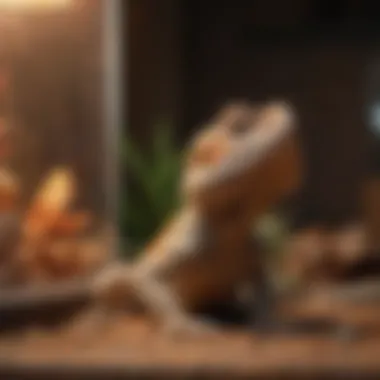
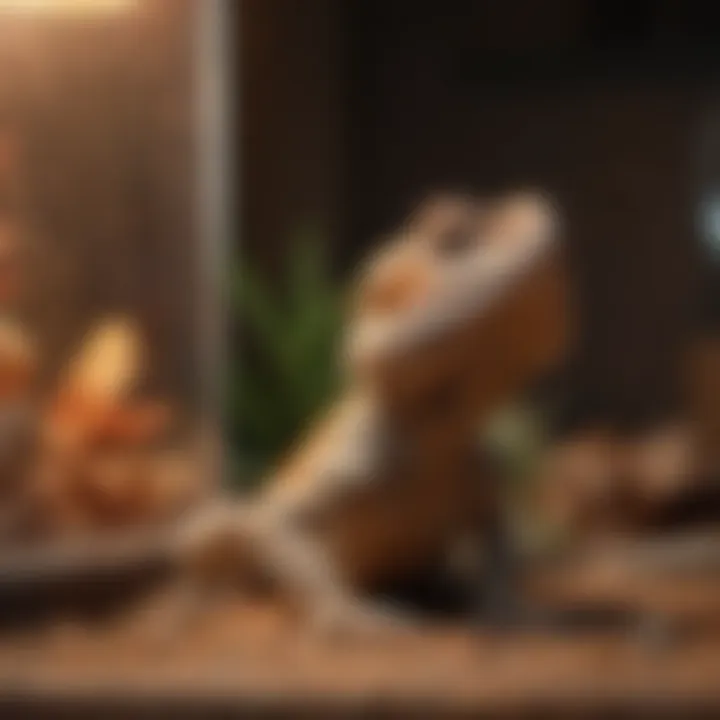
Diverse food choices enrich their life experiences. Additionally, proper nutrition helps maintain healthier habits for caretakers. Staying informed about the dietary needs fosters responsibility towards these fascinating reptiles, thereby benefiting both parties.
Nutritional Needs at Different Life Stages
As bearded dragons develop, their nutritional requirements shift significantly. These shifts occur mainly during three life stages: juveniles, adults, and seniors.
Juvenile Bearded Dragons
Juvenile bearded dragons grow rapidly in their early days. This growth phase demands a diet high in protein and essential nutrients.
Many consider juvenile bearded dragons a beneficial choice for new owners. This is mainly because they often have less complex behaviors compared to adults, thus making them easier to observe and interact with. However, their aggressive eating habits also pose a challenge; providing the right feeding routine is essential to ensure their development without overfeeding.
Incorporating options like crickets, roaches, and finely chopped greens forms a strong foundation. Bearded dragons require protein for growth, but overindulgence can lead to obesity, typically seen often with juvenile dragons.
Adult Bearded Dragons
In the adult stage, a marked transition occurs in dietary habits. Whereas high protein content is crucial during growth, adult bearded dragons benefit more from balanced calcium and phosphorus ratios. Therefore the focus shifts more towards fresh vegetables and fruit rather than just protein sources.
Physical activities also become more noticeable as energy levels stabilize. With an adult’s healthy exercises routine, their nutritional choices should facilitate easy digestion and a moderate energy level without excessive fats. The diet protects internal organs, ensuring longevity. Adults display less complex features compared to juveniles, making food preferences easier to gauge.
Seniors and Their Unique Requirements
As bearded dragons enter their senior years, another change arises in their dietary needs. Older bearded dragons may encounter challenges, such as less efficient digestion. Therefore, softness in food and ease of ingestion become vital factors.
Seniors often experience health problems related to obesity or malnutrition. Their food must avoid excess fat while ensuring essential nutrients. The focus balances protein, fiber and moisture content to help curb health issues like dehydration or tissue depletion.
Choosing the right nutrients and offering diverse options help improve silence happiness too. Ultimately, recognizing their unique needs can mean a significant difference in leading a comfortable, long life.
In summary, understanding the shifting dietary requirements at different life stages will lead to successful and enjoyable bearded dragon ownership.
Main Components of Bearded Dragon Diet
Understanding what makes up the diet of bearded dragons is crucial for every owner. These reptiles thrive on a diet with specific nutrients essential for their growth and health. An appropriate mix of proteins, vegetables, and fruits contributes to their overall well-being and optimal lifespan. The primary components can often make a significant difference in the long-term health and vitality of bearded dragons. Therefore, every pet owner should focus on these components to promote good health.
Insects as a Protein Source
Bearded dragons are omnivores and require proteins in their diet, especially from insects. They are high in protein and promote proper growth, required for a healthy metabolism and energy levels.
Suitable Insects
Not all insects are suitable for bearded dragons. Crickets are a popular choice due to their high protein content and ease of availability. Dubia roaches are another excellent option thanks to their nutritional value and low-fat content. Waxworms can be included but should be limited due to their high-fat content.
These insects provide not just protein but also crucial vitamins and minerals that support the proper function of bodily systems. Properly selecting the insects supports healthy weight and reduces risks for several health issues. However, be aware that sources matter. Make sure to source insects from reputable suppliers.
Feeding Frequency and Quantity
Feeding frequency and the amount of insect matter are integral to a balanced diet. Juvenile bearded dragons require daily feedings due to their rapid growth. In contrast, adults can typically be fed every other day. Adults should receive a varied amount of insects, generally around 50 to 80 insects per feeding. Overfeeding can lead to obesity, yet underfeeding stunts healthy growth and energy levels.
Vegetables and Greens
Vegetables play a crucial role in providing essential vitamins and fiber, supporting digestive health. Bearded dragons should be fed leafy greens and other vegetables regularly.
Types of Vegetables to Include
Including lettuce alone in the diet is not advisable as some types, particularly iceberg lettuce, have little nutritional value. Dark leafy greens, such as collard greens, turnip greens, and dandelion greens, are much better. They provide calcium, essential for bone health. Other vegetables like bell peppers and carrots offer additional vitamins Besides this, mix textures for more interesting meals.
Adding diversity is key. Including various vegetables keeps the bearded dragon stimulated and prevents boredom. This variety ensures balanced nutrition over time, which can significantly emphasize health benefits.
Optimal Preparation Methods
How vegetables are prepared impacts their effectiveness. Chopping or shredding vegetables makes it easier for bearded dragons to consume them. Additionally, slightly steaming certain vegetables ensures a better nutrient release. Avoid saline additives. Always ensure that no harmful substances have been introduced.
Lightly cooking can retain some nutrients while improving palatability. Proper preparation retains essential nutrients, assisting in healthy digestion.
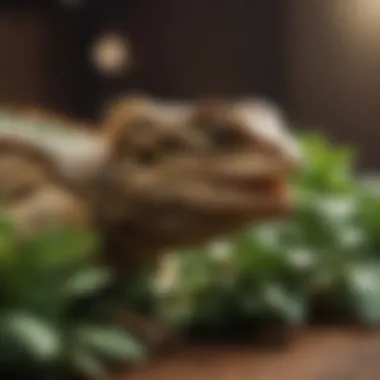
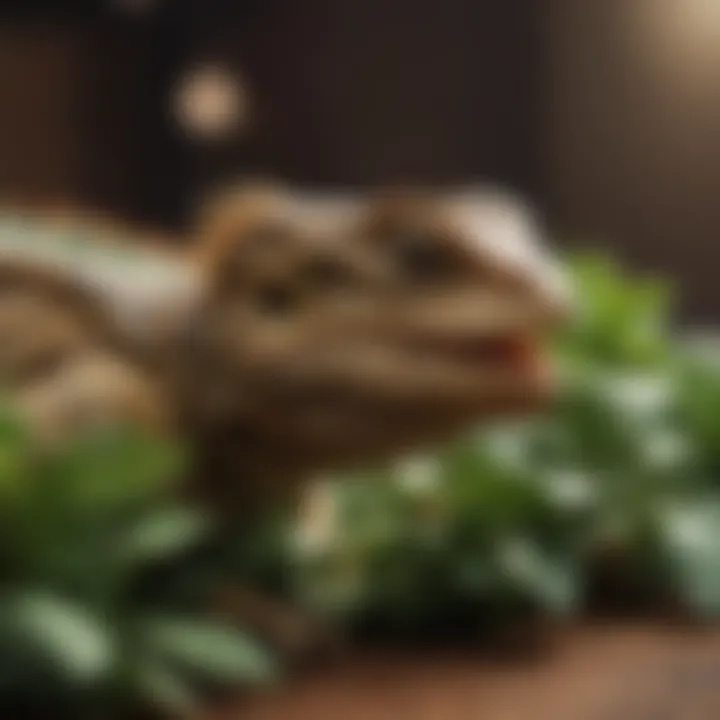
Fruits: Treats or Essentials?
Fruits may not be nutritional essentials, but they can serve beneficial roles in moderation. It is critical to approach fruit inclusion mindfully as too much can lead to excessive sugar consumption.
Fruits Safe for Consumption
Among suitable fruits, strawberries, bananas, and mangoes provide vitamins and hydration benefits.
While they are safe, be sure to limit fruit intake. These additions provide variety that bearded dragons may enjoy but should not form the foundation of the diet due to high sugar levels.
Frequency of Fruit Treats
Limit fruit servings to small amounts and only a few times a week for adults and less for juveniles. Too frequent consumption can result in obesity and affect overall health.
Adjust treatments carefully and consider changes in their health and vitality when determining frequency.
Keeping fruits as treats rather than staples balances taste with health. Maintaining moderation ensures healthy lifestyles for bearded dragons throughout their lives.
Water and Hydration Considerations
Importance of Hydration
Hydration plays a critical role in maintaining the health of bearded dragons. Water is essential for their metabolism, facilitating digestion and nutrient transport. When properly hydrated, bearded dragons will do better with### bodily functions. They are more active, displaying typical behavior, and will have a healthier appetite.
Bearded dragons come from arid regions and obtain moisture from their food, but this is not sufficient by itself, especially in captivity. Overlooking hydration leads to several health issues like dehydration, shedding problems, and severe renal damage. Bearded dragons should always have access to fresh water coinciding with meetings of dietary requirements.
Methods for Providing Water
Providing water can be accomplished in various ways, depending on the dragon's preferences and unique habits. Different methods can suit different situations:
- Shallow Water Dishes: Use a stable and shallow dish for your bearded dragon to drink from. It should be wide enough for comfort but shallow enough to avoid drowning risk.
- Misting Techniques: Lightly misting your dragon a few times a week can provide essential hydration, particularly after they eat. The moisture will not just provide drinking opportunities but can help with shedding.
- Water Absorbent Foods: Some owners choose to feed water-rich foods, such as certain fruits and moist vegetables, which supplement hydration naturally during meals. Examples include cucumbers and watermelon.
- Soaking Baths: Occasional warm water baths make an effective method to ensure hydration. Immerse the dragon for about 15-20 minutes. This method is helpful if the dragon seems particularly apathetic or is shedding.
The arrangement you choose should ensure that it's clean, refreshed regularly, and safe. Proper hydration is key to apex health.
Always monitor water consumption and seek veterinary advice upon noticing unusual behavior such as lethargy or significant appetite changes.
Feeding Practices and Habits
Feeding practices and habits are crucial for the health of bearded dragons. Proper feeding contributes to their overall well-being, digestion, and growth metrics. Owners must be conscious of both the frequency and quality of the food provided. Ignorance in this area can lead to more severe health issues down the line.
Feeding Frequency Recommendations
The frequency of meals varies notably across different life stages. Understanding these differences is key to maintaining a healthy diet for your bearded dragon.
- Juvenile Bearded Dragons: They require more food, typically 2 to 3 times a day, to support rapid growth. This frequency is essential because juvenile dragons have higher metabolic rates.
- Adult Bearded Dragons: Later in life, their feeding frequency may reduce to once a day, or even every other day, as their growth stabilizes and caloric needs moderate.
- Seniors and Their Unique Requirements: Older bearded dragons often eat less, but their nutritional needs do not fall. Offer them food 3 to 4 times a week, focusing on easily digestible options.
It is critical to maintain a consistent schedule that matches their lifestyles and supports their energy expenditure. Skipping feedings may lead to deficiencies in nutrient intake.
Signs of a Healthy Feeding Routine
Recognizing signs of a healthy feeding routine should be evident to attentive owners. A variety of indicators can confirm your bearded dragon is experiencing proper nutrition:
- Active Behavior: Observing an energetic demeanor during active hours indicates proper caloric intake.
- Healthy Weight: You should be able to feel the ribs lightly, but not see them visibly sticking out. This balanced physique illustrates that the diet is, indeed, moderate.
- Regular Bowel Movements: Ideally, tortoise should maintain a regular schedule for defecation, indicating efficient digestion and hydration.
- Eagerness to Feed: A consistent interest during feeding times also shows that they are thriving. They will actively show enthusiasm instead of being disinterested.
- Appearance of Skin and Eyes: Clean and hydrated skin and bright eyes often correlate positively with a nutrient-rich diet and hydration.
Being mindful of these aspects fosters long-term health for your reptile sulcata, aligning closely with their specific dietary needs and feeding advancements.
Remember: Observation is key! Regular assessment of your bearded dragon’s habits and condition can lead to a happier, healthier life.
Potential Dietary Mistakes
Understanding potential dietary mistakes is critical. Many owners believe they give their bearded dragons the best diet. However, misconceptions often lead to unintentional harm. These mistakes may affect a dragon's health. Thus, knowing them is key to providing optimal care.
Common Misconceptions

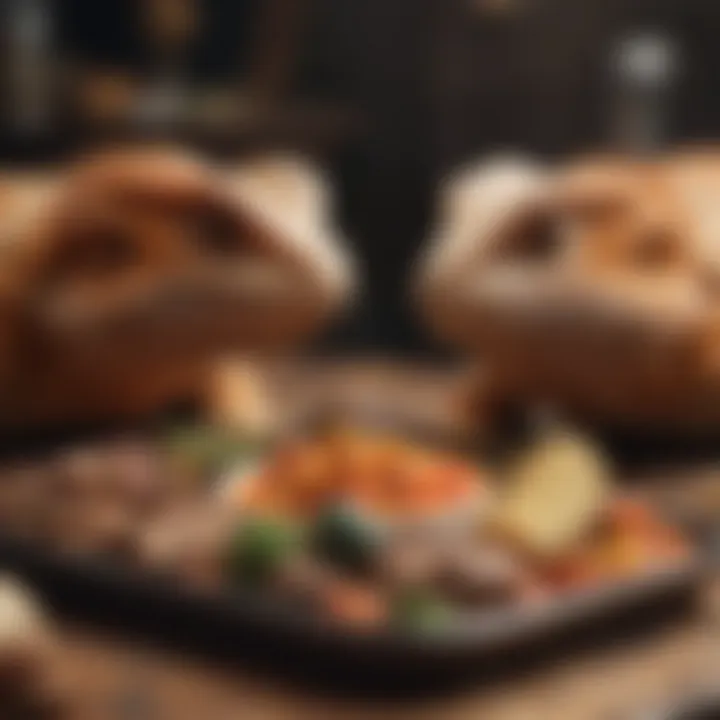
Despite good intentions, many handlers of bearded dragons make errors in diet based on common myths. For instance, the idea that bearded dragons prosper solely on high-protein insects is incorrect. While protein is crucial, variety is vital. A diet with only insects lacks essential fiber and nutrients obtained from vegetables and greens. This can cause digestive issues. Therefore, balance between proteins and vegetables is essential.
Another misconception is the assumption that certain foods are universally safe. Food items like iceberg lettuce may appear healthy, but offer little nutritional benefit. They often lead to dehydration due to high water content, with minimal vitamins. Instead, dark leafy greens like collard greens are recommended. These provide better nutrition.
Lastly, some fans mistakenly observe patterns from other reptile care guides. Care for bearded dragons differs significantly from tortoises or snakes. Expecting similar diets can be harmful. Thus, research specific requirements for bearded dragons.
Identifying Poor Nutrition Symptoms
Poor nutrition often gives signals that bearded dragon owners must recognize quickly. Lack of correct diet can manifest in many ways.
One common sign is a lack of energy. If a dragon remains lethargic or uninterested in its environment, it may not receive required nutrients. Weight loss can also indicate problems. A healthy bearded dragon should maintain its weight. A visible decrease in body mass might suggest inadequate feeding or poor dietary balance.
Skin condition reflects health directly. A dull or flaky skin surface can signify dehydration. Furthermore, aggressiveness or unusual behavior may track back to dietary issues. A suitable diet helps stabilize overall mood and activity levels.
Finally, bowel movements are an important indicator. If droppings seem abnormal in color or consistency, it might signal improper diet. Consistency should be firm and mostly comprises of green waste. Monitoring these signs leads to catching poor nutrition early. This promotes longer life and well-being.
Proper nutrition reflects the general health and longevity of bearded dragons. An informed owner helps ensure a balanced diet for their pet.
Supplements and Nutrient Additions
Supplements and nutrient additions play a crucial role in maintaining the health and vitality of bearded dragons. While whole foods lay the foundation of their diet, there are instances when optimal nutrition is hard to achieve through diet alone. Understanding how to effectively incorporate supplements can ensure that the dietary needs of these reptiles are fully met.
When to Consider Supplements
Using supplements should not be a default practice, but there are specific situations that may warrant their use. If a bearded dragon is not eating a diverse diet, supplementation could bridge gaps in essential vitamins and minerals. Certain life stages require heightened nutrient intake due to increased growth or reproductive activities. For instance, juveniles and breeding females often have elevated nutritional needs that a regular diet may not fulfill entirely. In such cases, considering calcium and vitamin D3 supplements can be beneficial.
Furthermore, environmental factors like diet inadequacies, lack of natural light, or incorrect heat ranges can impact absorption of nutrients. When a bearded dragon shows signs of malnutrition or exhibits changes in behavior, such as lethargy or diminished appetite, reassessing their nutritional plan, and potentially adding supplements, is important. Hence, monitoring their diet regularly enhances the ability to make necessary adjustments promptly.
Types of Recommended Supplements
When selecting supplements, it is important to choose those aligned with known dietary deficiencies in bearded dragons. Some key supplements include:
- Calcium Powder: Essential for bone health. It’s mostly critical during juvenile growth and reproductive phases.
- Multi-Vitamin Powder: Supports overall health. It should be something that combines various vitamins that their diet may lack.
- Vitamin D3 Supplements: Aids calcium absorption. Particularly useful when bearded dragons do not get sufficient sunlight or UVB light exposure.
- Phosphorus-Free Calcium: Useful because excess phosphorus can hinder the absorption of calcium.
It’s important to understand how to use these supplements. Over-supplementation can lead to health complications, such as hypercalcemia. Dosing should be guided by the bearded dragon’s weight and age, and it’s best to consult a reptile veterinarian before changes. Be mindful of adjustments to the diet, as quality whole foods should still be emphasized for long-term health.
The integration of suitable supplements can greatly enhance the overall well-being of bearded dragons when dietary deficiencies are present.
In summary, paying attention to when and what type of supplements to use helps craft a well-rounded feeding regimen for bearded dragons. Their nutritional welfare is fundamental to ensuring a robust, energetic life.
Epilogue: Prioritizing Optimal Nutrition
Nutrition is a critical part of maintaining the health and well-being of bearded dragons. A proper diet is not just about meeting their basic needs; it influences their behavior, growth, and lifespan. Neglecting nutritional guidelines can lead to serious health issues, including metabolic bone disease and stunted growth. This is why understanding the nuances of bearded dragon dietary requirements is paramount.
Healthy bearded dragons often exhibit better energy levels and activity, affirming the importance of nutrition in overall health.
The Role of Nutrition in Lifespan
A balanced diet plays an integral role in the longevity of bearded dragons. Key dietary components include proteins, vitamins, and minerals that contribute to their health over the years.
For example, calcium is essential throughout their life. Insufficient calcium intake leads to bone problems and even reduced mobility. Sufficient vitamin D3 is also necessary for absorbing calcium efficiently.
- Protein sources, especially from insects, aid growth during their juvenile stage.
- Adult dragons require less protein but still benefit from a varied diet of plant matter and occasional insects.
- Seniors, on the other hand, may need softer foods or easy-to-digest options to maintain health.
In summary, optimal nutrition not only enhances the lifetime potential of bearded dragons but also shapes their quality of life as they age.
Long-term Health Benefits of Proper Diet
Feeding bearded dragons a proper diet yields various long-term health benefits. A foundational aspect of this is disease prevention. A well-rounded diet helps support a robust immune system, making dragons less susceptible to illnesses.
Additionally, the right nutrition promotes healthy shedding, which is crucial for their skin's wellbeing. This process ensures that they remain comfortable as their body grows.
Some key benefits include:
- Enhanced digestion and nutrient absorption
- Maintenance of appropriate body weight
- Improved vitality and enhanced temperament
Moreover, introducing varied foods keeps bearded dragons from becoming too reliant on one type of food, helping to avoid imbalances. Such imbalances can lead to deficiencies or excesses in essential nutrients. Investing in proper nutritional practices thus holds both immediate and future benefits for owners and their pets alike.
By prioritizing optimal nutrition, bearded dragon owners can ensure that their pets lead healthy lives, with a well-documented connection between diet and overall wellness.















